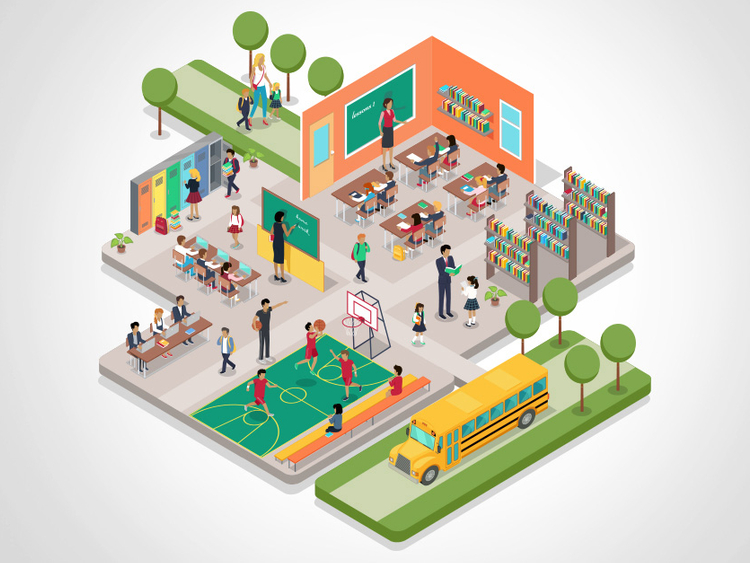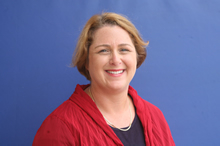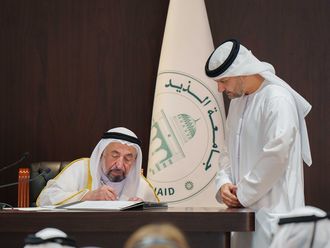When choosing a school in the UAE, are parents attracted to big-ticket items such as technology labs and sporting facilities? Or do they prefer basics such as fresh paint and non-slip flooring? The reality lies somewhere in between.
Speaking generally on local standards compared to other countries, Shar Dean says Dubai schools do well on the surface but “the devil is in the details — staffing, maintenance, built quality and safety”. Dean is Education Coordinator for The Sustainable City with Diamond Developers and has 30 years of teaching experience in the UAE and elsewhere. She has studied the design of educational environments at master’s level.
Dean believes teachers make the greatest impact on a child’s learning but that great facilities and resources can certainly help a great teacher be even better.
“Many world-renowned educationalists attribute a great deal of importance to the environment,” she says, quoting Italian educator Loris Malaguzzi, founder of the Reggio Emillia philosophy, who called the classroom the “third teacher”.
“Colourful and bright classrooms often attract parents but are actually considered not the best environment for learning,” says Dean. “There should be a balance: an area for focus as well as stimulus. Particularly in the UAE, there should be opportunities for students to interact with the natural world. Larger homes with smaller backyards and the harsh climate leave children few opportunities to experience nature.”
Size matters
Room size and layout are problems noted by parent and educator Therese Sequiera, who wants teachers to be consulted more on classroom design. “Many classrooms don’t have adequate storage or overall space to allow for rearranging furniture to suit activities,” she says. “The best classrooms I’ve [seen] had two adjacent classrooms with a shared art/science/messy space and a multipurpose storage area behind, accessible from each room.”
Schools must have decent auditorium or theatre space for performances, says Sequiera, who has more than 25 years’ teaching experience. “Some schools have grown so much they don’t have space to gather together.” She adds that staffrooms must be pleasant environments, and that schools need plenty of small rooms for therapy, music, meetings and group work.
In 2016, the 40-year-old Jebel Ali Public School added a secondary school to its programme and swapped its quaint but antiquated digs in Jebel Ali Village for a 34,000-sq-ft site in Damac’s Akoya development. As one of Dubai’s oldest schools, it was in the unique position of applying practical experience when designing brand-new, purpose-built facilities. Among them were a 25-metre swimming pool, a multipurpose sports hall, music rooms, dedicated food technology labs, a 642-seat auditorium, an award-winning grey water recycling system, thermal insulation throughout and outdoor classrooms.
Nahla Osman, a teacher and parent who was chairperson of Jebel Ali School’s PTA during the move, says facilities aren’t everything. “Before the move, the school delivered an excellent British curriculum through modest facilities. It was led by an excellent teaching reputation, not by its cafeterias and number of new iPad trolleys.
“However during the transition and growth into the new site, the school has been able to significantly upgrade its facilities and provide students with a whole lot more, and importantly, maintain its not-for-profit status and its fabulous community spirit.”
For Osman, the basics of infrastructure are a safe, clean and inspiring environment, with teaching staff the ultimate factor in a quality education.
Parking problems
Many parents agree, despite being attracted to shiny new buildings and cutting-edge technology, they look beyond. Niveditha Santosh, whose daughter goes to GEMS Metropole, says all schools must consider parking as a priority. “Just like there are specific checklists regarding fire, health and safety, the KHDA should add parking to checklists. They should also enforce [a] law regarding speed and [the use of] seatbelts around the school drop-off areas.”
Suzanne Lee Pollock, a parent at Safa Community School and a former teaching assistant elsewhere, says handwashing facilities are lacking in many places. “Foundation to Year 2 should have a wash trough for messy hands and cleaning up after arty activities. Lower years should also have easy access to outdoor areas and bathrooms.”
The lack of shaded outdoor green space for children to play safely is high on the list too. Lev Medgard has been a parent at several schools in Dubai. She says the lack of shade trees means children miss out on being able to climb them. “I understand schools don’t want more liability but I climbed trees, so did my husband and our children have no idea what it’s like to climb a tree.”














